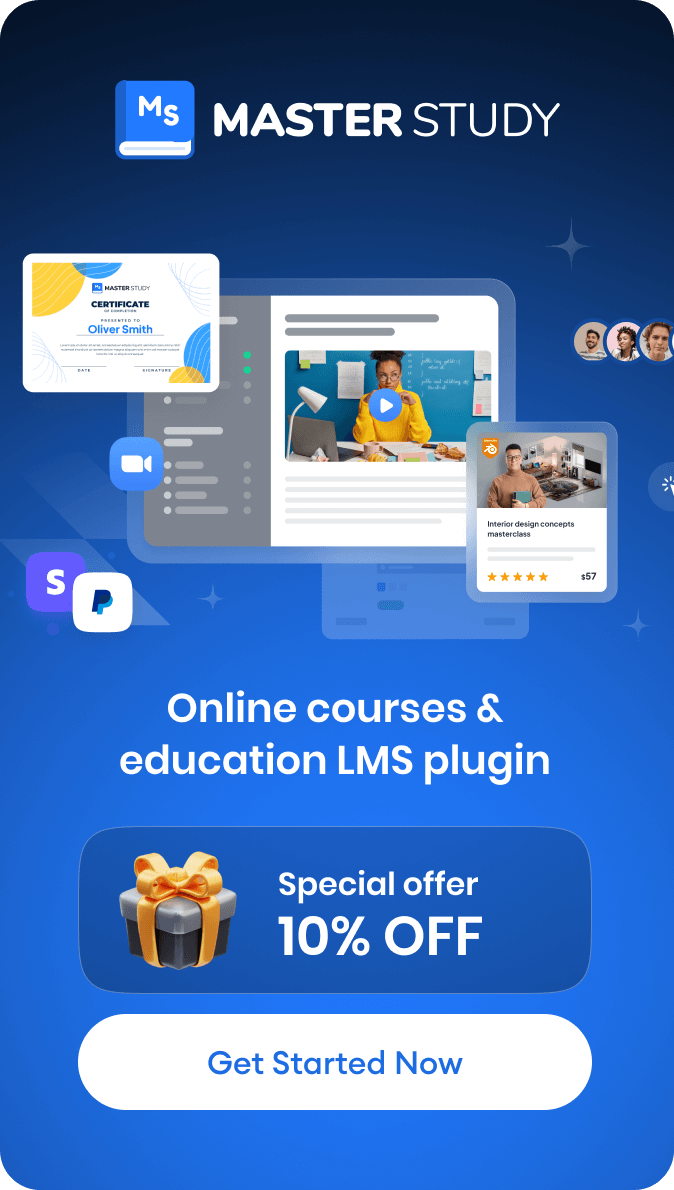Online learning has advantages, but it’s not always easy to motivate students to use it. That’s why we’ve found that many different types of motivation are at play. Let’s take a look at some of the most common motivations for online learning, so you can best apply them to your platform or curriculum design when considering how to motivate your students:
In life, you may want to learn something new or update your knowledge. For instance, if you want to become a programmer and have no idea what programming is all about, this type of motivation will be useful in helping you go through with learning. Online learning platforms make the entire process of knowledge acquisition and pedagogy delivery fast and smooth.
How to get motivation for online learning?
- Financial Motivation
- Personal Motivation
- Professional Development Motivation
- Social Motivation
- Mastery Motivation
- Achievement
- Competence
- Fear of Missing Out (FOMO) Motivation
- Desire for knowledge
- Conclusion
1. Financial Motivation
Financial motivation is a powerful way to get students started with online learning. Students who want to earn money can be motivated to learn online, and financial motivation can be a good tool for getting them started.
For example, imagine that you want to learn how to start your own business. You can find online courses on picking out the right type of business, how much money it costs, and what things are involved in running your own business.
This information is valuable because it helps people make informed decisions about what they should do next—they will have more knowledge about the options available in their community and which ones would fit their needs best.
2. Personal Motivation
Personal motivation is an internal force that drives us to achieve our goals. It’s the desire to accomplish something for its own sake rather than for extrinsic rewards like money or praise. As we’ve already discussed, external motivators are not always effective—and in fact, they can be demotivating if you feel someone else’s standards are judging your success.
Personal motivation is the most powerful motivator; it keeps us going when we feel like giving up and quitting our online courses (or just about any other goal). This type of motivation is rooted in our core values and beliefs about ourselves—it gives us a sense of purpose behind our actions, which drives us forward even when times get tough.
3. Professional Development Motivation
The need to learn new skills is a powerful motivator for learning online. You may be motivated to learn something that will help you advance your career or simply interested in becoming a better professional so you can land a promotion at your current job.
One reason people often choose online courses as their method of education is that they offer flexibility and convenience. You can learn at home, whenever and wherever it’s convenient for you—or maybe even while traveling!
Because there are many potential reasons why someone would want to get involved with an online course, it’s important to know what kind of motivation might work best for you.
3. Social Motivation
Social motivation is a desire to be accepted by others, to be part of a social group, and to be liked or admired by others. People with high social motivation are generally happier and more popular than people who lack this motivation.
People with high social motivation want friends, relationships, and to feel like they belong somewhere. Social media platforms such as Twitter, Instagram, or YouTube are perfect because they allow them to easily build relationships with other users with similar interests and hobbies.
Social motivation is one of the most powerful types of motivation because it can lead you towards achieving your goals by helping you make new friends or find inspiration from people who have been successful in your field before you began pursuing it yourself.
4. Mastery Motivation
You’re reading this article because you want to learn something new. Maybe it’s a course on coding or a language like Spanish. Maybe it’s even something as simple as how to use Excel better. Whatever the case may be, your motivation for learning is that you want to be able to do something well. You want to know more about a subject than before and might even want to be able to do it better than others can do it. The reason for this is mastery motivation—the desire for achievement in an area where you feel competent or confident in your knowledge and ability.
5. Achievement
Achievement motivation is a desire to succeed, be noticed, and be recognized. Achievement goals include getting a promotion or recognition for doing a good job at work, winning an award, completing an online certification program for work purposes, and so on. Students who are motivated by achievement want to do well in order to feel good about themselves. For example, students may complete an online course because they have been accepted into a graduate program or because they want to improve their job prospects.
When compared with mastery motivation, achievement motivation relates more strongly to performance-based rewards (like money) than intrinsic rewards (such as feeling pride from doing a good job).
6. Competence
Competence is the desire to learn more about a subject. It’s a positive motivation, as you want to improve your work. You can learn more about a subject by reading books, watching videos, and attending seminars. You can also learn more about a subject by taking online courses.
Online courses are often cheaper than traditional courses and will allow you to pass certification exams that may give you an advantage in the job market or increase your potential salary.
7. Fear of Missing Out (FOMO) Motivation
Fear of Missing Out (FOMO) motivation is a powerful motivator. It can motivate people to learn online, especially when concerned about being left behind. FOMO motivates people to take action, so they don’t miss out on something important or valuable. When you feel like you’re missing something and don’t know how much longer it will be available for free, it’s easy to get motivated and sign up for an online course to learn more.
Fear isn’t always bad; sometimes, it compels us forward in life and makes us want things we never thought possible before! But there’s a fine line between fear that pushes you forward and fear that holds you back from pursuing your dreams – so make sure the fear isn’t keeping you from doing what needs to be done.
8. Desire for knowledge
This type is driven by your desire to learn something new or improve at something you already do well at. It is more likely that an individual will be intrinsically motivated if they have a high interest in the subject matter. Intrinsic motivation is often more effective as it creates a sense of ownership over what you are doing, which increases your chances of success in the future.
MasterStudy LMS is one of the most popular e-learning brands to meet learning goals because it provides continuous learning solutions through which students can learn at their own pace with interactive content and effective teaching methods such as videos, audio lectures, etc., which makes it easy for anybody who wants to start their career as an online instructor or tutor.
Conclusion
The types of motivation for online learning can help understand the different types of learners and what they need to succeed. This is really important because we all people need the aim, the surge of eagerness, devotion, and accurate plans to establish a well-structured online learning business.
Once you have determined your goals and targets you will need to choose a relevant feature-rich LMS (learning management system) or e-learning tool, which will help you realize your project. MasterStudy LMS is considered to be one of the powerful WordPress plugins to create and sell online courses, lessons, and quizzes.






























